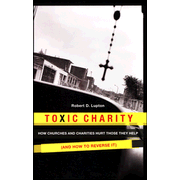Toxic Charity: How Churches and Charities Hurt Those They Help
Publisher’s Description
Public service is a way of life for Americans; giving is a part of our national character. But compassionate instincts and generous spirits aren’t enough, says veteran urban activist Robert D. Lupton. In this groundbreaking guide, he reveals the disturbing truth about charity: all too much of it has become toxic, devastating to the very people it’s meant to help.
In his four decades of urban ministry, Lupton has experienced firsthand how our good intentions can have unintended, dire consequences. Our free food and clothing distribution encourages ever-growing handout lines, diminishing the dignity of the poor while increasing their dependency. We converge on inner-city neighborhoods to plant flowers and pick up trash, battering the pride of residents who have the capacity (and responsibility) to beautify their own environment. We fly off on mission trips to poverty-stricken villages, hearts full of pity and suitcases bulging with giveaways—trips that one Nicaraguan leader describes as effective only in “turning my people into beggars.”
In Toxic Charity, Lupton urges individuals, churches, and organizations to step away from these spontaneous, often destructive acts of compassion toward thoughtful paths to community development. He delivers proven strategies for moving from toxic charity to transformative charity.
Proposing a powerful “Oath for Compassionate Service” and spotlighting real-life examples of people serving not just with their hearts but with proven strategies and tested tactics, Lupton offers all the tools and inspiration we need to develop healthy, community-driven programs that produce deep, measurable, and lasting change. Everyone who volunteers or donates to charity needs to wrestle with this book.
Author Bio
Robert D. Lupton is founder and president of FCS Urban Ministries (Focused Community Strategies), through which he has developed two mixed-income subdivisions, organized a multiracial congregation, started a number of businesses, created housing for hundreds of families, and initiated a wide range of human services in his community. Lupton is the author of Theirs Is the Kingdom; Return Flight; Renewing the City; Compassion, Justice, and the Christian Life; and the widely circulated “Urban Perspectives,” monthly reflections on the Gospel and the poor.
Editorial Reviews
“A superb book. Toxic Charity should serve as a guide and course correction for anyone involved in charitable endeavors at home or abroad.”
“Toxic Charity provides the needed counterbalance to a kind heart: a wise mind. Though I often thought, “Ouch!” while I was reading the book, Robert Lupton gave this pastor what I needed to become a more effective leader.”
“Lupton’s work, his books and, most importantly, his life continue to guide and encourage me to live and serve in a way that honors God and my neighbor. I highly recommend Toxic Charity.”
“Lupton’s book reminds us that it is more blessed to give than to receive. He shows how the people called poor can be blessed by supporting opportunities for them to give their gifts, skills, knowledge and wisdom to creating the future.”
“In Toxic Charity, Lupton reminds us that being materialistically poor does not mean that there is no capacity, no voice, and no dignity within a person. If we truly love the poor, we will want to educate ourselves on how best to serve. Let our charity be transformative not toxic.”
“Lupton says hard things that need to be said, and he’s earned the right to say them. Believers would do well to receive his words with the mindset that ‘faithful are the wounds of a friend.’”




